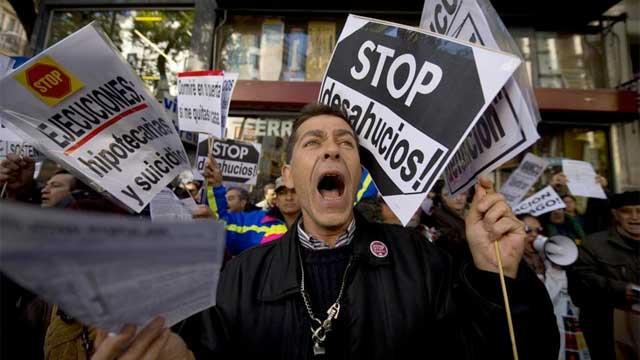
Photo: Pierre-Philippe Marcou
Austerity has spawned general strikes in individual countries across the troubled European Union. But this week may see something to add to the union’s tensions: a coordinated, multinational mega-strike.
Organized labor plans a general strike against the E.U.’s austerity policies, borderless and spanning the south of the continent. With more than 25 million people out of work, Europe’s biggest unions have vowed to lead marches and demonstrations on Nov. 14 that unite opposition parties, activist movements like Spain’s M15 and a growing sea of unemployed to challenge their national governments, banking leaders, the IMF and EU policymakers to abandon austerity cuts ahead of a high-stakes budget meeting in Brussels later this month.
What makes Wednesday’s strike even more threatening to Europe’s managerial elite is the strong support it is receiving from traditional labor groups that rarely send their members into the streets—foremost, among them, the European Trade Union Confederation, representing 85 labor organizations from 36 countries, and totaling some 60 million members.
“We have never seen an international strike with unions across borders fighting for the same thing—it’s not just Spain, not just Portugal, it’s many countries demanding that we change our structure,” says Alberto Garzón, a Spanish congressman with the United Left party which holds 7% of seats in the Spanish Congress. “It’s important to understand this is a new form of protest.”
The strike is expected to cause near or total shutdowns of the four most debt-battered countries—Portugal, Spain, Italy and Greece—as all major unions march to oppose devastating cuts in salaries, pensions, benefits and social services, meanwhile protesting tax hikes and harsh labor reforms.
There will be solidarity marches elsewhere. Though not formally striking, France’s largest labor groups signaled support with dozens of demonstrations planned nationwide. Rail workers in Belgium are striking; so are labor groups in Malta and Cyprus. In Britain, organizer Andrew Burgin of the Coalition of Resistance said marches and demonstrations there would “forge links across Europe, showing Britain’s austerity struggles as part of a pan-European, international movement.”
And from Germany and Switzerland to Turkey, eastern Europe and Scandinavia, workers and many organizations have promised to rally around the single message: No to austerity.
Fabian Zuleeg, a chief economist at the European Policy Centre in Brussels, sees the phenomenon as a “Europeanization of the debate,” where labor movements “now recognize that if they want to have an impact, they have to take their protests up to a higher level, a European level.” Just as capital moves freely across national boundaries, a new borderlessness of protest is now waiting there to meet it—which could be a game-changer, forcing nations and the continent as a whole to re-think taxation, government spending and other fiscal policies.
Some, like Ben Tonra, a professor of international relations at University College Dublin, liken the continental strike to a creation of a new European public space.
“With a shift in political forces in lots of member states, a shift at the E.U. level away from austerity to a focus on jobs [will] occur,” says Tonra. The real question Wednesday, he adds, isn’t how much noise the southern countries make but whether there is “a new and enlarging cast of characters, [with] comparable demonstrations in Germany, in Austria, in Finland—E.U. countries that don’t have histories of mass mobilizations over austerity.”
Austerity opponents say the strike isn’t intended to grind down Europe’s already weakened economy, but to send a clear message to governments and the Troika—the European Commission, European Central Bank and the IMF—that austerity cuts aren’t working to solve the debt crisis, but instead are worsening the problem.
“The situation is urgent: we have to stop this downward spiral and reverse the austerity measures, which even the IMF admits are wrong,” says Patricia Grillo, a spokesperson for the ETUC.
So what real impact will the strike have on policymakers heading to Brussels for a budgetary showdown Nov.22-23? It is potentially a turning point in the debate over austerity which has pitted Europe’s banking class against its citizens; it may also set up wider, more energized protests ahead.
But, “it’s very unlikely that it will overturn the general direction in which we’re moving,” says Zuleeg of the European Policy Centre, although “it might signal to leaders that there are other things they must take into consideration, like unemployment.”
A wise wake-up, suggests Garzón of Spain. Because “it’s a beginning of mobilizations,” he says. “it’s not an end.”
3 WAYS TO SHOW YOUR SUPPORT
- Log in to post comments
















